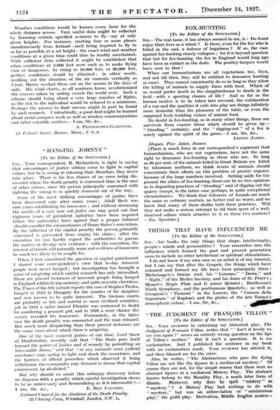"HANGING JOHNNY " [To the Editor of the SPECTATOR.] Fin,--Your
correspondent, R. Richardson, is right in saying that miscarriages of justice seldom come to light in capital crimes, but he is wrong in inferring that, therefore, they never take place. There is far less chance of an error being dis- covered where the death penalty is concerned than in the case of other crimes, since the person principally concerned with righting the wrong is so quickly removed out of' the way.
Some of the most striking miscarriages of justice have been discovered only after many years ; Adolf. Beck was nine years establishing his innocence ; and without discussing the merits of a case now sub judice one may point out that eighteen years of persistent agitation have been required before the authorities have agreed that a proper tribunal should consider the circumstances of Oscar Slater's conviction. By the infliction of the capital penalty the personuprimarily concerned is prevented from urging his claim ; after the execution we can hardly expect the authorities to pursue the matter or divulge new evidence ; with the execution, the interest of friends will naturally wane and evidence of innocence be much less likely to be sought for.
When I first considered the question of capital punishment I shared your correspondent's view that to-day innocent people were never hanged ; but investigation has brought a sense of misgiving which careful research has only intensified. There are proved instances of innocent people being hanged in England within living memory, and quite recently elsewhere. The Times of the 8th instant reports the case of Stephen Timka, hanged in 1913 in Hungary for the murder of his daughter and now known to be quite innocent. The German courts are probably as fair and careful as most civilized countries, yet in 1918 a sailor named Pfander was sentenced to death for murdering a peasant girl, and in 1926 a mere chance dis- covery revealed his innocence. Fortunately, in the latter case the death penalty was commuted and the man released. But much more disquieting than these proved instances are the many cases about which there is misgiving.
One of the most eminent jurists of our time, Lord Shaw of Dunfermline, recently said that "The State puts itself beyond the power of justice and of remedy by permitting an irrevocable doom,- and that "at any moment some i•adicial mischance may spring to light and shock the conscience, and the barriers of official procedure which observed it being withdrawn, the community may demand in shame that capital punishment be abolished."
But why should we await this unhappy discovery before we dispense with a penalty which careful investigation shows to be as unnecessary and demoralizing as it is irrevocable ?—
. National Council for the Abolition of the Death Penalty. 23 Charing Cross, Whitehall, London, S.W. 1.






























 Previous page
Previous page